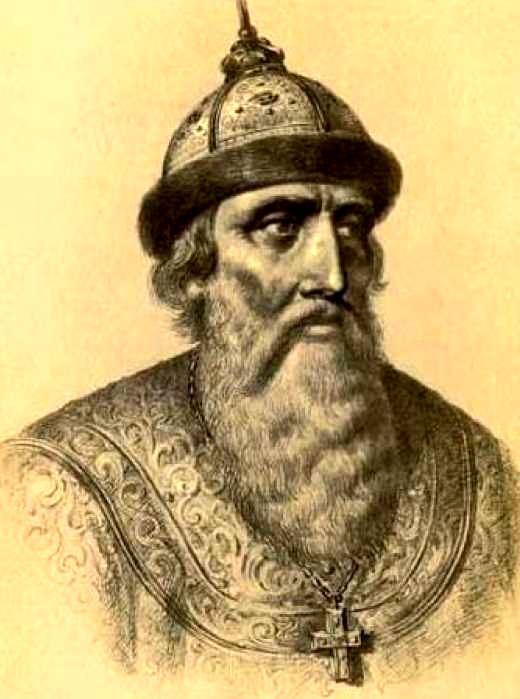Владимир Мономах Vladimir Monomakh 1113-1125
Владимир Мономах Vladimir Monomakh 1113-1125

Владимир Всеволодович Мономах рос во времена, когда Русь находилась в состоянии войны и внешней, и внутренней. Постоянно нападали половцы, а родственники-князья бились друг с другом за уделы. После смерти отца Всеволода Ярославича Владимиру по праву мог достаться киевский престол, но он, пытаясь избежать новой усобицы, пригласил княжить Святополка, своего двоюродного брата, старшего в роду, хотя местные жители Святополка не любили и хотели видеть князем Владимира.
В 1113 году Святополк умер, и киевские жители избрали князем Владимира. Время его правления считается лучшим периодом в истории Киевской Руси. Мономаху удалось усмирить половцев, и они долгое время не нападали на Русь. Удельные князья подчинялись власти киевского князя. Стала расцветать культурная жизнь страны. Выросло множество монастырей, храмы украшались фресками. Начали составляться летописи. Сам Владимир создал адресованное потомкам «Поучение», в котором описал собственные достижения и дал советы, как поступать в различных жизненных ситуациях.
Vladimir Vsevolodovich Monomakh grew up during the time when Rus was at war, both foreign and domestic: the Polovtsy were maintaining their attacks, while the prince’s relatives were fighting each other over the apanages. On the death of his father Vsevolod Yaroslavich, Vladimir could rightfully receive the throne of Kiev, but, trying to avoid a new feud, he invited Sviatopolk, his cousin, to rule as the eldest in the family, although the local townspeople did not like Sviatopolk and would prefer to have Vladimir as their prince.
Sviatopolk died in 1113, and the inhabitants of Kiev elected Prince Vladimir, whose reign was considered the best period in the history of Kievan Rus. Monomakh managed to pacify the Polovtsy, and they ceased attacks on Rus for long. The apanage princes were subdued under the authority of Kievan prince. The cultural life of the country started to flourish. The number of monasteries was increasing, the temples were decorated with frescoes. The chroniclers began to compile their records. Vladimir himself wrote the «Instruction» addressed to the posterity, in which he described his own achievements and gave advice on how to act in various situations.
Более 800 000 книг и аудиокниг! 📚
Получи 2 месяца Литрес Подписки в подарок и наслаждайся неограниченным чтением
ПОЛУЧИТЬ ПОДАРОКДанный текст является ознакомительным фрагментом.
Читайте также
Владимир Мономах
Владимир Мономах 1053–1125 гг. Великий князь Киевский, политик и полководец Древней Руси. Без нужды не клянитесь, но, дав клятву и поцеловав крест к братье, соблюдайте клятву крепко.Больного посетите. Праху мертвеца поклонитесь, ибо все мы смертны.Да не застанет вас солнце в
Владимир Мономах — Александр Невский — Дмитрий Донской
Владимир Мономах — Александр Невский — Дмитрий Донской Среди великих россиян особую группу составляют известные князья-ратоборцы. Русь Киевская, Русь Владимирская и Русь Московская равно представлены здесь своими славнейшими
ВЛАДИМИР МОНОМАХ
ВЛАДИМИР МОНОМАХ Русь сложилась как государство на самой окраине культурно-христианского мира, на границе Европы, за которой простиралось безбрежное море степей, служивших преддверием Азии Эти степи со своим кочевым населением были настоящим бичом для Древней Руси
Владимир Мономах (1053–1125) великий князь киевский, полководец и общественный деятель, писатель
Владимир Мономах (1053–1125) великий князь киевский, полководец и общественный деятель, писатель С именем Владимира Мономаха связан последний период государственного единства и могущества Киевской Руси. Владимир, родившийся за год до смерти своего деда Ярослава Мудрого,
При чем здесь Мономах?
При чем здесь Мономах? Всемирно известен древний царский венец – шапка Мономаха. Ею венчались на царство все русские цари в XVI–XVII в. Очень давно о ней сложили легенду, будто в XII в. византийский император Константин прислал ее и другие регалии на золотом блюде киевскому
Владимир Vladimir 972-1015
Владимир Vladimir 972-1015 Владимир — сын Святослава, не совсем равноправный брат старших Ярополка и Олега, так как был сыном ключницы Малуши, рабыни.Владимир княжил в Новгороде до 977 года, когда между братьями разгорелась междоусобная война. Брат Олег в бою погиб, а Ярополк
Святополк Изяславич Sviatopolk Izyaslavich 1093-1113
Святополк Изяславич Sviatopolk Izyaslavich 1093-1113 Святополк до 1093 года княжил в Новгородских землях, киевский престол он занял после смерти Всеволода Ярославича, отца Владимира Мономаха. Владимир Всеволодович Мономах передал ему княжение добровольно как старшему из внуков
Мстислав Владимирович Mstislav Vladimirovich 1125-1132
Мстислав Владимирович Mstislav Vladimirovich 1125-1132 Мстислав Владимирович — старший сын Мономаха — после смерти отца занял киевский престол. Его правление было недолгим, но славным.Половцы, укрощенные Мономахом, узнав о его смерти, напали на Русь, но Мстислав, получивший ратный
4. Владимир Мономах – Великий князь земли русской
4. Владимир Мономах – Великий князь земли русской 19 мая 1125 года в Киеве скончался Великий князь Владимир Мономах. По «Летопись по воскресенскому списку», СПб, тип. Э. Праца, 1856: «В лето 6633. Преставися великий князь Володимер Манамах Всеволодич, княжив лет 13; престави же ся
КОНСТАНТИН IX МОНОМАХ
КОНСТАНТИН IX МОНОМАХ Византийский император в 1042— 1055 гг. Род. ок. 1042 г. Умер янв. 1055 г.Константин принадлежал к древнему роду Мономахов. Занимая благодаря родовитости высокое положение, обладая большим богатством и отличаясь красотой, он был для многих весьма почтенных
Владимир Набоков (Vladimir Nabokov) [1899–1977]
Владимир Набоков (Vladimir Nabokov) [1899–1977] Подлинная жизнь Себастьяна Найта (The Real Life of Sebastian Knight)Роман (1938–1939, опубл. 1941)«Себастьян Найт родился тридцать первого декабря 1899 года в прежней столице моего отечества» — вот первая фраза книги. Произноситее сводный младший брат Найта,